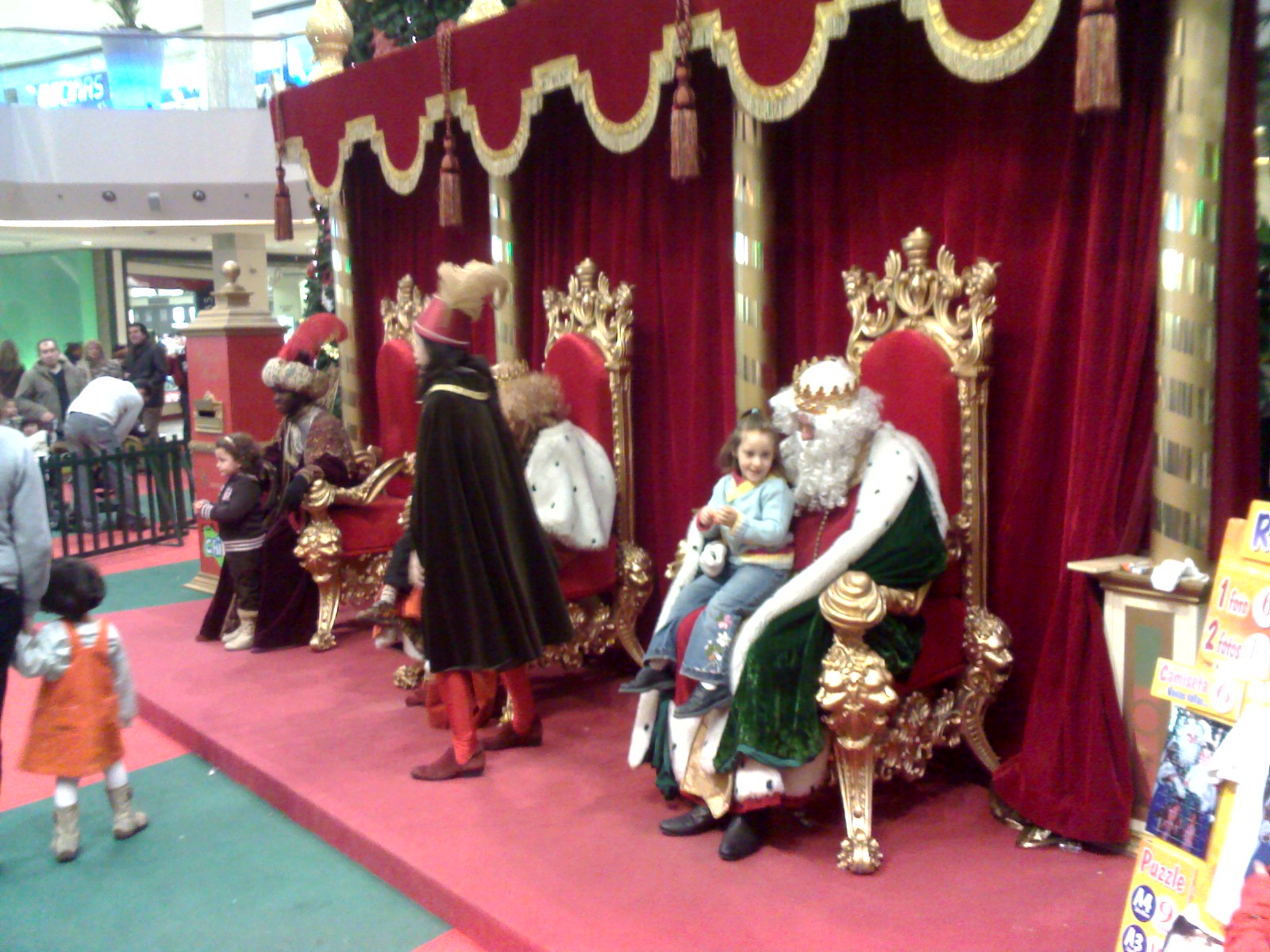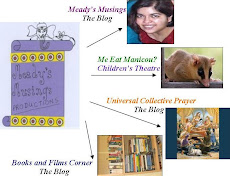
A Shopping Centre in Spain (as taken in 2007 from Wikimedia Commons)
"The tradition in Spain and some Latin American countries is that the Three Wise Men are who bring gifts to children at Christmas. In recent years, as an assimilation of the Anglo-Saxon tradition of Santa Claus, they often appear at gift shops and shopping malls, where children have the opportunity to take a picture sitting on their knees and deliver the letter with their demands."
The purple elephant and the little mouse had gone off to the market to stock up on food for all the many house guests that Meady's Musings Production House has been accumulating over the last few weeks when the most funniest thing happened! So funny the purple elephant is rolling on the floor in laughter appearing as if he is in some circus stunt (God forbid he should ever be entrapped in one of those!) as he retells the story with the little mouse...
Apparently the little mouse sat on his shoulder as they went through the market and hid behind his ears every time they noticed a passerby that wouldn't understand that they could be 'clean' mouses in markets. They always do this...and the little mouse advises the purple elephant by whispering into his ear what looks good and what does not...what is too pricey...what is a deal!
So using that tried and tested approach they had already procured honey for the bears (we have since had to buy honey outside our contract after the bee colony strikes earlier on especially to prevent any further Winnie the Pooh impersonations!), bread for the shepherds and even a bouquet of sunflowers for me! :) When that most funniest thing happened!
They saw three men arguing in the middle of the market square! They all had come out of their SUV-sports utility vehicle...each with a smart phone in their hand...arguing that the tallest one who was the driver and the owner of the SUV did not know where he was going as each of their phones gave different directions and that for sure he must have mis-programmed his SUV's GPS! What made it so funny for the purple elephant and the little mouse was the whole scene and antics! The SUV had grinded to a halt right in the middle of the market square kicking up a considerable amount of dust and screeching! And the three men immediately exited from it popping out like if they were compressed hot air inside of there! And all three congregated in a circle pointing at smart phones and then the sky and each trying to out voice the other! But that was not all...
As they argued three large camels seem to appear from no where and used their long necks to scoop a man each up into the air and onto their backs! The expression on each of the men's faces as they all of a sudden grew beards and donned long silky robes is what still has the purple elephant rolling on the floor and I have to tell you my floor tiles are not faring well!
As you might have guessed from that little story the Three Wisemen or the Three Magi or the Three Kings whatever you like to call them are in town! :) And here on the calendar we wish to salute them! :) We had a lot of fun all of last year's Advent calendar long with them and must now again bow to them! And shall do it in this format:
-On Meady's Musings: Who were the Magi? as described on the New Advent (Catholic encyclopedia)and that lovely song with Hugh! ;)
-On UCP: The Time and Circumstances of Their Visit again as described on the New Advent (Catholic encyclopedia).
-On Books and Films Corner: A glimpse of them in the 2006 film The Nativity Story.
So here we go!:
WHO WERE THE MAGI?
As taken from the New Advent
"who the magi were
Non-Biblical evidence
We may form a conjecture by non-Biblical evidence of a probable meaning to the word magoi. Herodotus (I, ci) is our authority for supposing that the Magi were the sacred caste of the Medes. They provided priests for Persia, and, regardless of dynastic vicissitudes, ever kept up their dominating religious influence. To the head of this caste, Nergal Sharezar, Jeremias gives the title Rab-Mag, "Chief Magus" (Jeremiah 39:3, 39:13, in Hebrew original — Septuagint and Vulgate translations are erroneous here). After the downfall of Assyrian and Babylonian power, the religion of the Magi held sway in Persia. Cyrus completely conquered the sacred caste; his son Cambyses severely repressed it. The Magians revolted and set up Gaumata, their chief, as King of Persia under the name of Smerdis. He was, however, murdered (521 B.C.), and Darius became king. This downfall of the Magi was celebrated by a national Persian holiday called magophonia (Her., III, lxiii, lxxiii, lxxix). Still the religious influence of this priestly caste continued throughout the rule of the Achaemenian dynasty in Persia (Ctesias, "Persica", X-XV); and is not unlikely that at the time of the birth of Christ it was still flourishing under the Parthian dominion. Strabo (XI, ix, 3) says that the Magian priests formed one of the two councils of the Parthian Empire.
Biblical evidence
The word magoi often has the meaning of "magician", in both Old and New Testaments (see Acts 8:9; 13:6, 8; also the Septuagint of Daniel 1:20; 2:2, 2:10, 2:27; 4:4; 5:7, 5:11, 5:15). St. Justin (Tryph., lxxviii), Origen (Cels., I, lx), St. Augustine (Serm. xx, De epiphania) and St. Jerome (In Isa., xix, 1) find the same meaning in the second chapter of Matthew, though this is not the common interpretation.
Patristic evidence
No Father of the Church holds the Magi to have been kings. Tertullian ("Adv. Marcion.", III, xiii) says that they were wellnigh kings (fere reges), and so agrees with what we have concluded from non-Biblical evidence. The Church, indeed, in her liturgy, applies to the Magi the words: "The kings of Tharsis and the islands shall offer presents; the kings of the Arabians and of Saba shall bring him gifts: and all the kings of the earth shall adore him" (Psalm 71:10). But this use of the text in reference to them no more proves that they were kings than it traces their journey from Tharsis, Arabia, and Saba. As sometimes happens, a liturgical accommodation of a text has in time come to be looked upon by some as an authentic interpretation thereof. Neither were they magicians: the good meaning of magoi, though found nowhere else in the Bible, is demanded by the context of the second chapter of St. Matthew. These Magians can have been none other than members of the priestly caste already referred to. The religion of the Magi was fundamentally that of Zoroaster and forbade sorcery; their astrology and skill in interpreting dreams were occasions of their finding Christ. (See THEOLOGICAL ASPECTS OF THE AVESTA.)
The Gospel narrative omits to mention the number of the Magi, and there is no certain tradition in this matter. Some Fathers speak of three Magi; they are very likely influenced by the number of gifts. In the Orient, tradition favours twelve. Early Christian art is no consistent witness:
* a painting in the cemetery of Sts. Peter and Marcellinus shows two;
* one in the Lateran Museum, three;
* one in the cemetery of Domitilla, four;
* a vase in the Kircher Museum, eight (Marucchi, "Eléments d'archéologie chrétienne", Paris, 1899, I 197).
The names of the Magi are as uncertain as is their number. Among the Latins, from the seventh century, we find slight variants of the names, Gaspar, Melchior, and Balthasar; the Martyrology mentions St. Gaspar, on the first, St. Melchior, on the sixth, and St. Balthasar, on the eleventh of January (Acta SS., I, 8, 323, 664). TheSyrians have Larvandad, Hormisdas, Gushnasaph, etc.; the Armenians, Kagba, Badadilma, etc. (Cf. Acta Sanctorum, May, I, 1780). Passing over the purely legendary notion that they represented the three families which are descended from Noah, it appears they all came from "the east" (Matthew 2:1, 2, 9). East of Palestine, only ancient Media, Persia, Assyria, and Babylonia had a










